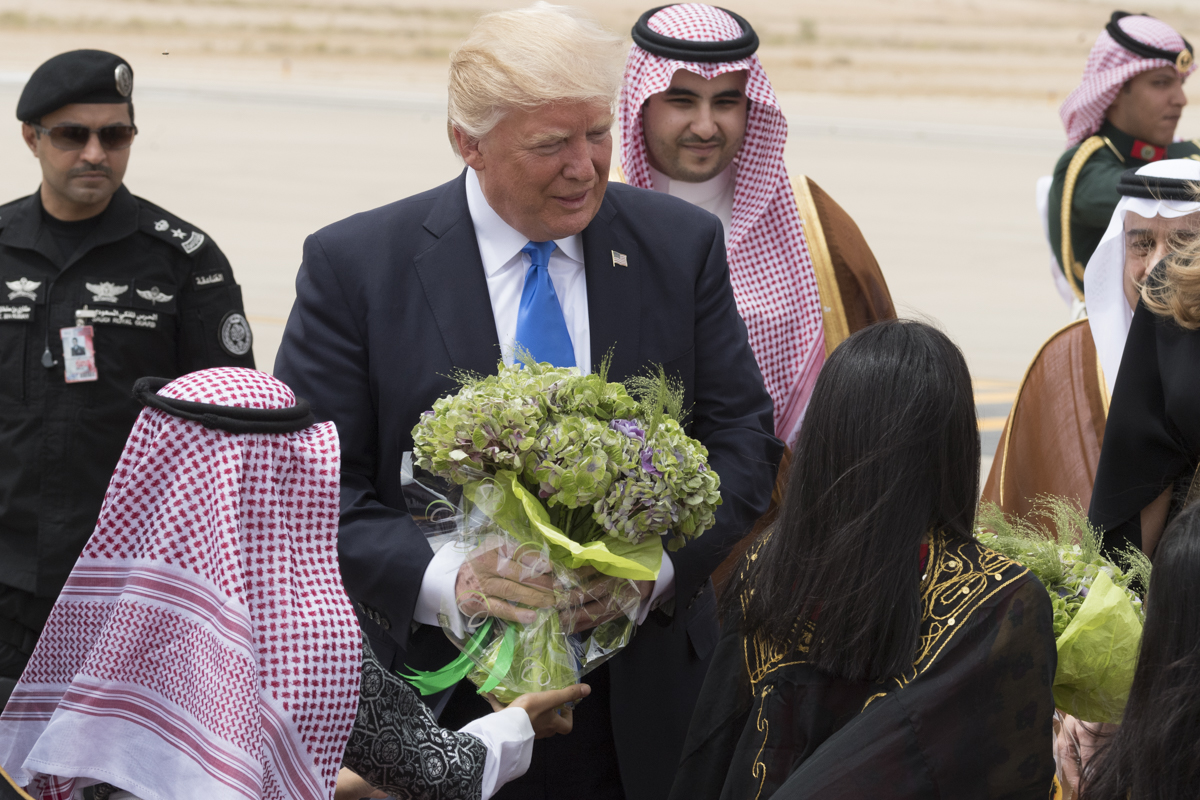It’s incredible how much money talks.
Is there a single person out there who isn’t repulsed at the sight of Donald Trump signing off on a $110-billion dollar arms deal with Riyadh — as Saudi rockets continue to pound Yemenis into the brink of destruction and starvation for a third year in a row?
Perspective is everything. You can just imagine how Yemenis — and Arabs by extension — at home and in the diaspora feel watching some of the richest countries in the world join forces to destroy one of the poorest. UNICEF reports that a child dies every 10 minutes from malnutrition, diarrhea and respiratory-tract infections in Yemen. These are all preventable deaths — but they’re happening because barely 45 per cent of the country’s health facilities are functioning.
When you consider decisions like the arms deal, it makes it a little easier to understand why America’s greatest foes — Iran and Syria backed by Russia — are relentless in their pushback, through their proxy support of Houthi Shias in Yemen and President Bashar al-Assad in Syria.
Their resistance doesn’t legitimize the political or humanitarian situation in Yemen, of course. But there is a staggering level of hypocrisy at play among the U.S. and its Gulf allies that is really in a class of its own.
Remember that the Saudi King Salman bin Abdulaziz, and Sheikh Hamad bin Isa Al Khalifa in Bahrain have been the Trumps of the Middle East — greedy, opuluent, war-mongering autocrats. Saudi Arabia gave rise to the 19 al-Qaeda hijackers on September 11, 2001 and in Bahrain, the quiet, bloody government-backed crackdown on pro-democracy protesters in 2011 left scores dead and thousands imprisoned.
For all the ignorance President Trump feigns around foreign affairs, he is undoubtedly up to speed on the Saudi terrorist connection and the irony of the U.S.-Saudi relationship. Back in 2011, after all, he called the Saudi regime the world’s biggest funder of terrorism and said the Saudi government uses “our petrodollars, our very own money, to fund the terrorists that seek to destroy our people while the Saudis rely on us to protect them.”
In a 2016 interview with Fox News during the campaign, Trump said, “Who blew up the World Trade Center? It wasn’t the Iraqis — it was Saudi.” He also condemned Hillary Clinton for taking Saudi money for the Clinton Foundation, challenging her to return the funds.
But after his presidential victory, Trump decided to give Riyadh the esteemed honour of hosting him on his first official foreign visit. And after a brief scare (by former U.S. President Barack Obama who held up an arms deal to Bahrain last year over human rights concerns), Riyadh has never been happier. After all, what do the deaths and suffering of thousands of Americans and Arabs mean when you have a billion-dollar arms deal on the table? Or when Trump’s business ties in Saudi Arabia are booming with the recent opening of eight different enterprises?
At a campaign rally in Alabama last year, Trump actually boasted about his affection for the Saudis and their money. “They are buying apartments and properties from me,” he declared. “They spend $40-50 million. I am supposed to hate them? I love them very much.”
Trump also had warm words for the King of Bahrain, who he met in Riyadh. “Our countries have a wonderful relationship together, but there has been a little strain, but there won’t be strain with this administration,” Trump reassured him. It was music to the Sheikh’s ears.
Is anyone else seeing a pattern here? Massive arms sales to Saudi Arabia, whose security forces this month have been busy raiding a town in their restive Eastern province under claims it is pursuing “Shia terrorists” (including a two-year-old child killed in crossfire); an arms deal with Bahrain, which is currently embroiled in yet another crackdown on Shia dissidents — a community who have long been politically and economically excluded by the Sunni-led government.
And then there’s Shia-majority Iran, whose people voted overwhelmingly for a president determined to open up to the world in last Friday’s presidential election – but who Trump called out for isolating.
Robert Fisk, a British journalist who has reported from the Middle East for more than 30 years, argues that the real purpose of Trump’s trip is simple: “To prepare the Sunni Muslims of the Middle East for war against the Shia Muslims.” It doesn’t sound very far-fetched — as long as the Saudi petrodollars and personal business deals keep rolling in.
This post also appears in The Globe and Mail.
Image: Flickr/The White House
Like this article? rabble is reader-supported journalism.





